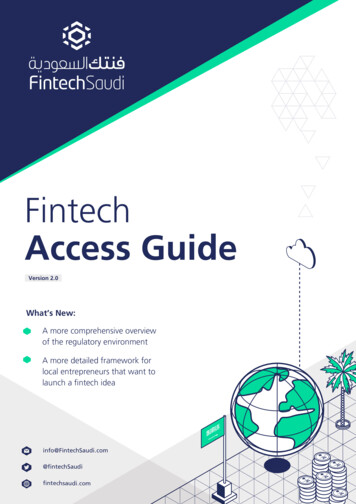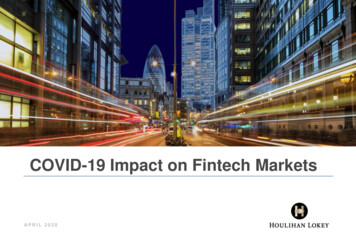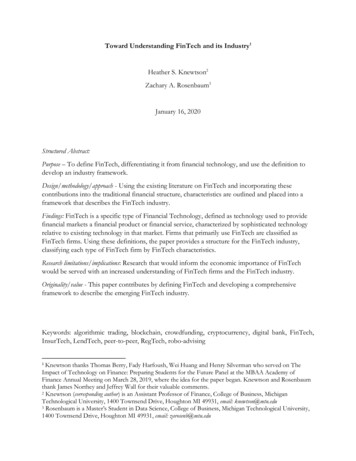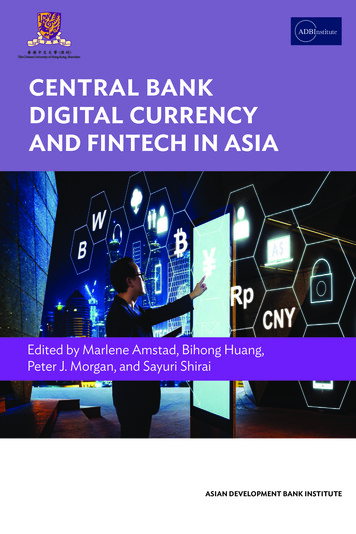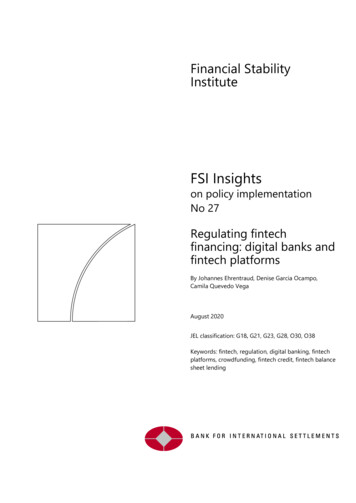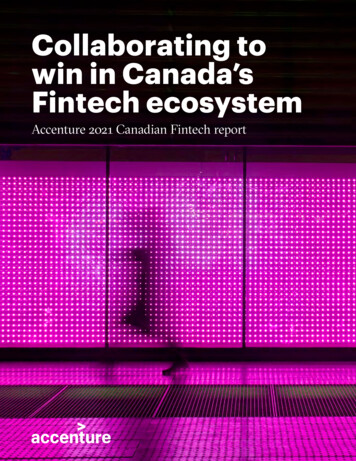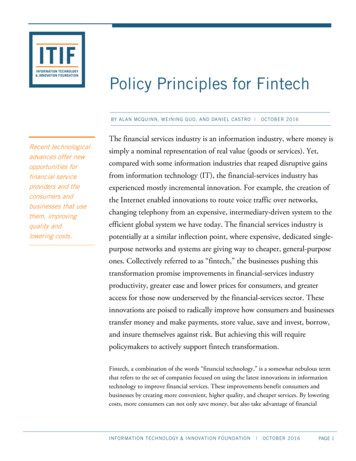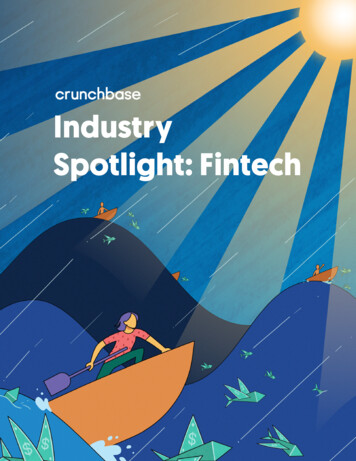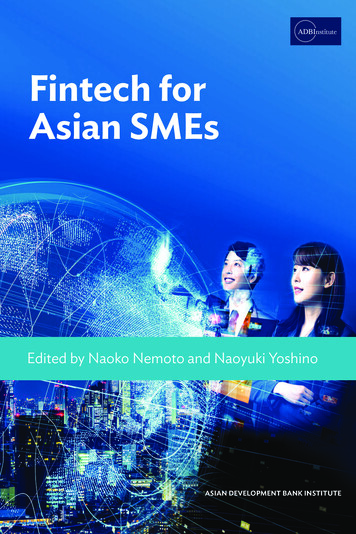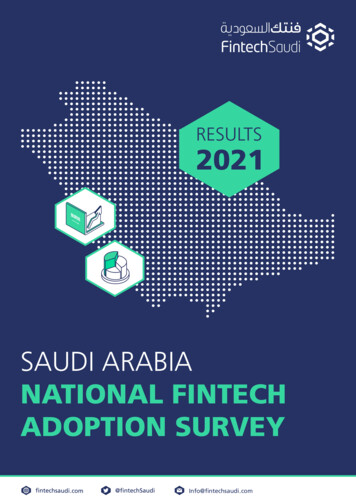
Transcription
HandbookFinTechRegulations.How to balanceincreasing AMLrequirementswith CustomerExperience.
02H A N D B O O K F I N T E C H R E G U L AT I O N SFintech has emerged as one ofthe fastest-growing sectors in thefinancial services industry andhas radically disrupted traditionalbanking.Innovation is evolving rapidly – faster payments,open banking, distributed ledger technology, artificialintelligence, robotics, digital assets, and cloud computing.However, this unprecedented success also brings aboutmore and more regulatory requirements and challenges.In recent years, Fintechs have achieved incredible growthand flexibility: They are able to launch quickly, adaptfast and focus on scalability. They frequently operatein more than one country from an early stage. Thisrapid, global growth doesn’t come without challenges.Financial services are among the most heavilyregulated sectors in the world, so it’s not surprising thatregulation has emerged as the number-one concernamong governments as Fintech companies take off. Astechnology is integrated into financial services processes,regulatory problems for such companies have multiplied,but determining the regulatory obligations of anybusiness can be a mammoth task.Financial servicesare among the mostheavily regulatedsectors in the world,so it’s not surprisingthat regulation hasemerged as thenumber-one concernamong governmentsas Fintech companiestake off.
03H A N D B O O K F I N T E C H R E G U L AT I O N SThroughout Europe, compliance in the financial servicesindustry is distinct from country to country and fallswithin a range of jurisdictions. In most countries, until acouple of years ago Fintechs were unregulated and havebecome fertile ground for scams and frauds. Becauseof the diversity of Fintech offerings and the disparateindustries it impacts, it is difficult to formulate a singleand comprehensive approach to these problems. For themost part, governments have used existing regulationsand, in some cases, customized them to regulate Fintech.This is an ongoing process and many Fintech businessmodels are affected in more ways than one, specificallysince Fintechs operating in more than one country mustbe compliant in multiple jurisdictions.Because of thediversity of Fintechofferings and thedisparate industriesit impacts, it is difficultto formulate a singleand comprehensiveapproach tothese problems.Businesses that fail to comply with AML and KYC regulations risk majorregulatory fines and irreparable damage to customer relationshipswhen something goes wrong. Hence, it is crucial to address theregulations swiftly and find solutions that integrate seamlessly intoone’s own business and aim to embed automation into the processes.By implementing a strong KYC system from the start, entrepreneurscan concentrate on growing their businesses instead of worrying aboutpotentially running afoul of the law later. Doing so will prevent firmsfrom exposing themselves to regulatory and compliance risks and helpthem scale more easily.
04H A N D B O O K F I N T E C H R E G U L AT I O N SRegulatory ChallengesFintechs Must Face.Digitization within the financial sectorhas led to a competitive market offeringaccess to services, products, new paymentservices, loans and increased capital – allpossible in near real-time.Thriving innovations have also affected the rate of financial sectorcrime, namely a significant rise in money laundering and terroristfinancing. Financial crime is a serious threat, estimated by the UN at 800 billion to 2 trillion worldwide per year.The European Union’s 5th Anti-Money Laundering Directive (AMLD 5)came into force on January 10th of this year, with the aim of creatinggreater transparency to due diligence requirements and limitinganonymity in order to combat financial crime. 800bn - 2tn/yearFinancial crime estimated by the UN.The impact of AMLD 5 is meant to be more far-reaching andnow strengthens regulatory controls across new sectors, includingcryptocurrencies, custodian wallet providers, estate agents and rentalintermediaries, all gaming operators and art dealers.The Directive also places greater emphasis on transparency aroundbeneficial ownership in order to fight financial criminals who havehidden behind complex corporate structures.
05H A N D B O O K F I N T E C H R E G U L AT I O N SLastly, the 5th Directive ensures access to trusted data,giving the Member States the necessary framework toupdate their risk mitigation processes.For those industries that have not been subject to AMLlaw before or entities that require updates to internalrisk mitigation processes, compliance can be costly andcomplicated. The first requirement of risk mitigation, KYCcan identify fraudsters before they can commit furtherfinancial crime.The first requirementof risk mitigation,KYC can identifyfraudsters before theycan commit furtherfinancial crime.Relevant amendments to AMLD 5 will now impact data collection andprocessing, such as KYC requirements, controls, risk assessment andmitigation, as well as customer due diligence for new and obligedentities within various industry sectors and for each Member State.Amendments include:1Cryptocurrencies.All platforms that offer exchanges in virtual currencies orcryptocurrencies, including providers of electronic wallets forcryptocurrencies like Bitcoin, Ether or Ripple, will face stricter controls.Exchanges are now required to register with relevant competentauthorities, conduct customer due diligence (CDD), and preparesuspicious activity reports (SARs). Financial intelligence units (FIUs) arerequired to keep records with the name and addresses of any customerpurchasing virtual currencies.2Prepaid cards.New thresholds for prepaid cards have been set from 150 to 250 ,with a 50 online limit. Cards are allowed only within the EU, unlesssuch cards are issued by a country with equivalent AML standards.Payment recipients will be allowed to accept e-money if the paymentoriginates from countries that adhere to AML standards.3Beneficial ownership.Under AMLD 5, greater transparency around ultimate beneficial owners(UBOs) now requires Member States to maintain interconnected andpublicly available national UBO registries. National authorities will haveaccess to registries for bank accounts and trusts.
06H A N D B O O K F I N T E C H R E G U L AT I O N S4Politically exposed persons.Member States must create politically exposed person(PEP) lists that include information such as titles, functionand roles.5High-value goods.Storing and moving funds through high-value goodshas been a source of criminal activity. The Directiveextends the range of goods that are now subject toreporting requirements with new thresholds, includingart, oil, precious metals, tobacco, historical, cultural andarchaeological artifacts.Failure to adhere toregulations carriesthe risk of strictenforcement in theform of fines, namingand shaming, andpotentially the lossof operating licenses.6High-risk countries.The EU identifies those countries with sub-standard AML regulations.Companies that conduct business with such countries are required toperform enhanced due diligence, including further investigations into thesources of wealth.The 5th Directive demonstrates a renewed commitment to support EUintegration and tackles one of its biggest challenges: financial crime.Working at both a central level and with national supervisors, the EUestablishes a legal framework for all Member States, whereby eachnation is responsible for implementing and enforcing the Directive’sregulations as part of their own national AML laws.Stricter requirements are essentialto fighting financial sector crime.Failure to adhere to regulationscarries the risk of strict enforcementin the form of fines, naming andshaming, and potentially the lossof operating licenses. The stakesfor EU and UK financial institutionsare high. Designing a system that iseffective, addresses inefficiencies,and uniformly supports technologicalinnovations in anti-money laundering/ combatting finance of terrorism(AML/ CFT) is an ongoing effort.
07H A N D B O O K F I N T E C H R E G U L AT I O N SThe FintechEcosystem.Digital BanksPayments, MobileWallets & RemittancesBanking SoftwareProvidersRegTechsLending &MarketplacesPropTechsFintechEcosystemAccounting& FinanceAlternativeFinanceOpen Banking &API ServicesBig Data &AnalyticsInsurTechsDLT, Blockchain &CryptocurrenciesRobo Advisors,Personal Finance& WealthManagementCapital Markets& Trading
08H A N D B O O K F I N T E C H R E G U L AT I O N SAs you can see, the Fintech ecosystem contains various industries.Hence, Fintechs should always be on top of the developments in theregulatory landscape and re-evaluate the choice of their KYC provideron a regular basis. On top of regulatory compliance, ask yourselffrequently if your onboarding really offers a premium customerexperience compared to your competitors. Ultimately, it all comes downto the following questions: Are you AMLD 5 compliant in all markets you currently offeryour products and services? What is your current KYC solution? How is it integrated into yourproduct or systems? Does the solution provide high conversion rates and outstandingcustomer experience? Is it a solution that also helps your company’s goals in the long run? Does your KYC provider cover as many countries as possible?Not only recognizing all types of international IDs to serve a widerange of customers, but also being compliant in more than just yourhome market. Can your KYC provider be your partner in expandingto other markets?
09H A N D B O O K F I N T E C H R E G U L AT I O N SDo You Know YourCustomer?An increasing number of Fintechs challengethe classic banks – regardless of whethertheir use case focuses on payment, savingsor crypto transactions, KYC and simple,comfortable digital user onboarding arebecoming more and more crucial forbusiness success.Seamless onboarding.Today’s customers have wants and needs that areprompting a major rethink in all industries: They demandrapid responses and high-quality service. Against thisbackdrop, an integral part of any digital strategy must beenhanced customer experience. Millennials, in particular,expect financial service providers to understand theirimperatives and to offer personalized, tailor-madesolutions.Opening an account in person at a physical branch isregarded as an anachronism, while the ability to bankanywhere and anytime is a given. However, deliveringon this expectation is not always that simple. Thecorresponding digital processes must not only complywith legal requirements but also be intuitive, fast andconvenient for the user. Consequently, your servicesshould be available both online and on mobile devices.After all, nowadays transactions are increasingly finalizedusing mobile devices.The correspondingdigital processesmust not onlycomply with legalrequirements butalso be intuitive, fastand convenient forthe user.
10H A N D B O O K F I N T E C H R E G U L AT I O N SKYC is key.If you want to offer your customer a convenient way of opening anaccount via agent or AI-based identification, you must ensure that yoursolution covers all platforms that your customers use – from desktop tomobile, from Android to iOS. Of course, you must be compliant with theKYC requirements of your respective industry and country.If you not only want to identify your customers, but would also like tohave contracts signed online, an eSigning solution will further improveyour onboarding process. Sign contracts in less than five minutes witha qualified electronic signature (QES) that is recognized throughoutEurope and has the same legal validity as a handwritten signature.Choose the right partner.The annual damages inflicted worldwide by Internet fraud are expectedto total six billion US dollars this year. As a result, cyberfraud is one ofthe greatest threats to our economy and the fastest-growing field ofmalicious moneymaking.Any company with digital business operations must address this challenge.It is essential to partner with an ID verification specialist you can completelytrust – and who has the skills, resources and state-of-the-art technologiesrequired to prevent even the most sophisticated fraud attempts.As a technology company with a full banking license, solarisBankprovides banking-as-a-service to businesses without an ownbanking license to enable them to offer financial services. Thefact that IDnow had an easy-to-integrate, lean API was a bigplus to us. IDnow’s video identification service is fully Know YourCustomer (KYC) compliant which helps our customers to fightfraud and onboard customers faster.”Delia König,Managing Director Identity Unit at solarisBank
11H A N D B O O K F I N T E C H R E G U L AT I O N SOnboarding by mail was an unnecessary bottleneckthat conflicted with our original vision of a differentexperience from visiting an investment banker in anoffice. That’s why we’re delighted to have IDnow asour technology partner, to unlock the scalability ofour platform.”Kevin Linser,Co-founder of Selma FinanceIt is important that the identification process offerssecurity for both us and our clients. We work withsensitive data and were looking for a partner wecould trust, with security expertise, and knowledgeof regulatory requirements and the divergentlegislative situations.”Jari Hautaranta,Customer Due Diligence Manager at Holvi
12H A N D B O O K F I N T E C H R E G U L AT I O N SCountryAustriaBelgiumBulgariaCroatiaCyprusCzech RepublicDenmarkAgent basedverification n/a1Estonia onacoNetherlandsNorway n/a2Slovakia rlandTurkeyUAEUnited Kingdom n/a2 AI basedverification n/a1n/a2 5 3 n/a2 5tbc4 5n/a2tbc4 Qualified ElectronicSignature Country/ProductMatrixA comprehensiveoverview ofthe regulatorapproved digitalKYC processby country.1. Usage of NemID for verification2. Usage of BankID for verification3. AI allowed if a selfie for documentmatching is provided4. Usage currently under review byauthorities 5. AI allowed if an additional checkby an agent after the verification isincluded in the process
13H A N D B O O K F I N T E C H R E G U L AT I O N SHow IDnowCan Help You.Higher conversion rates.Comprehensive compliance.Better conversion rates on anydevice so you can win morecustomers.The modular identity verificationprocess can be modified tomatch various legal or regulatoryrequirements.Outstanding reliability.Ideal for global deployment.Advanced artificial intelligence (AI)driven identity verification preventsfraud.Made for a connected world:Identify people anywhere andanytime.
14H A N D B O O K F I N T E C H R E G U L AT I O N SAutoIdent.Deep ID recognition intelligence ensures effectiveauthentication.AutoIdent provides great fraud prevention in conjunction with betterconversion rates and comprehensive compliance. Our hybrid identityverification solution combines the best of humans and machines. Weleverage state-of-the-art machine learning technology and a network ofidentity and fraud specialists to enable you to increase your onboardingrates – while keeping fraudsters at bay.VideoIdent.Since the approval of video identification in compliancewith the Money Laundering Act in Germany in 2014, manyfinancial institutions and Fintechs have opted for this way ofdoing digital onboarding.It offers significant advantages for both banks and companies, as wellas their customers. With IDnow’s Video Verification, you can verifyyour customers’ identity within a few minutes – it’s easy, secure, and incompliance with the law.Our EU-patented solution results in a clear increase in conversionrates compared to traditional offline procedures. It combines AI-basedtechnology with the expertise of highly qualified ident specialists.eSign.In just a few minutes, IDnow’s eSign enables contractconclusion without media disruption or additional hardware.All the customer needs is Internet access, a device with a camera andtheir valid ID document. The customer will first be identified beforebeing taken directly to the contract signing. Everything happens withinthe same process. That creates a great user experience, which in turnsignificantly increases the conversion rate.
15H A N D B O O K F I N T E C H R E G U L AT I O N SAbout IDnow.IDnow’s mission is to leverage its identity verification asa service (IVaaS) platform in order to make the connected world a saferplace. The ID validation solution from IDnow can be deployed in anyindustry where companies have online customer interactions that requirerobust security. IDnow’s solutions employ artificial intelligence to validatethe presence of security features on an ID document and to reliably detectforgeries. Potentially, the identities of more than 7 billion customers in 195countries could be verified.IDnow supports a wide variety of use cases, both in regulated industriesin Europe and for entirely new digital business models worldwide. Theplatform allows the ID process to be tailored on a case-by-case basis tospecific regional, legal, and business requirements.Questions? Let’s talk!Alexis SegoviaHead of FinTech Relations, IDnowalexis.segovia@idnow.de
Potentially verifyingover 7 billion peoplein 195 countriesOver 280clients aroundthe globeTeam of330Founded in2014www.idnow.ioIDnow GmbH Auenstr. 100, 80469 Munich, Germany T: 49 (0)89 41324 600 M: sales@idnow.de
of the diversity of Fintech offerings and the disparate industries it impacts, it is difficult to formulate a single and comprehensive approach to these problems. For the most part, governments have used existing regulations and, in some cases, customized them to regulate Fintech. This is an o
